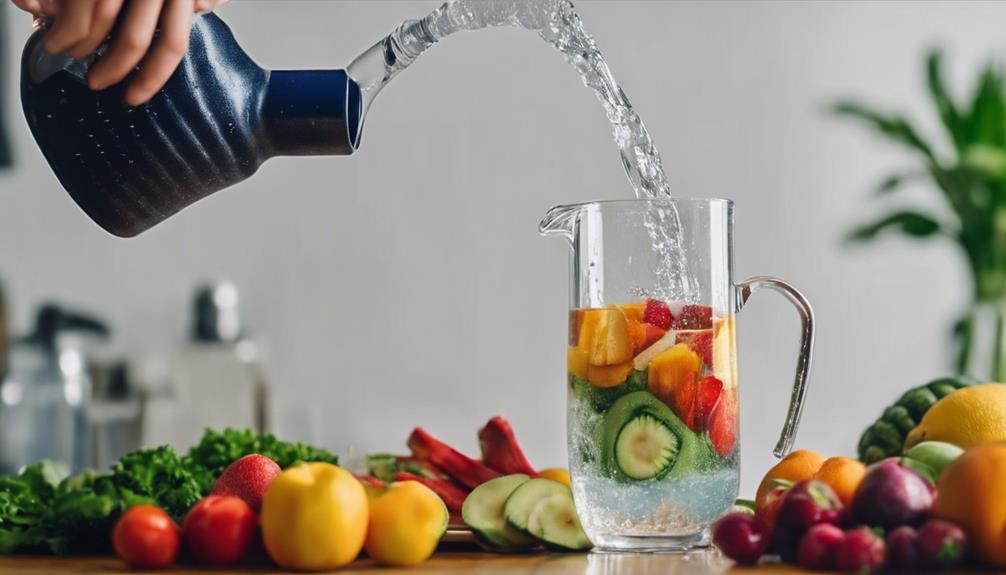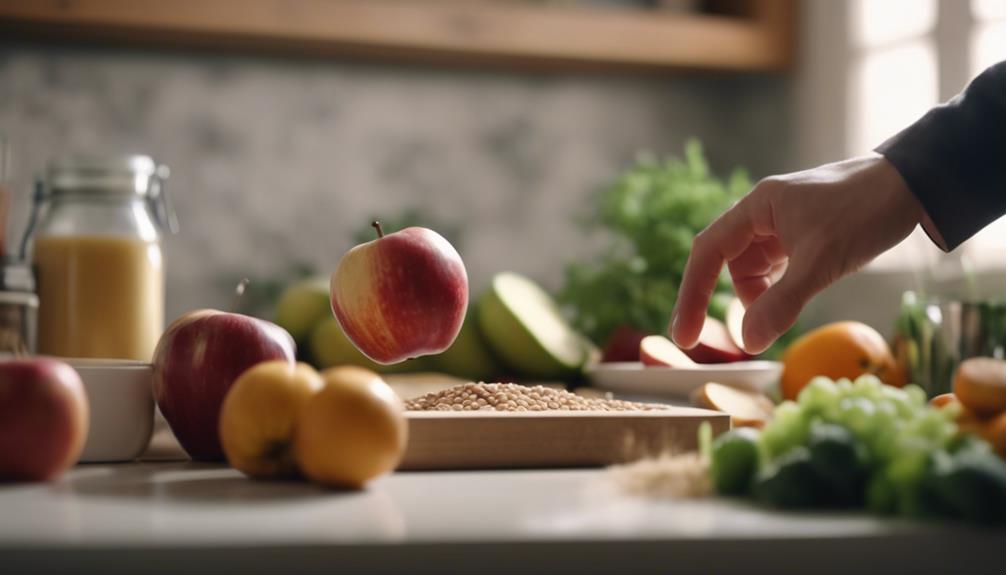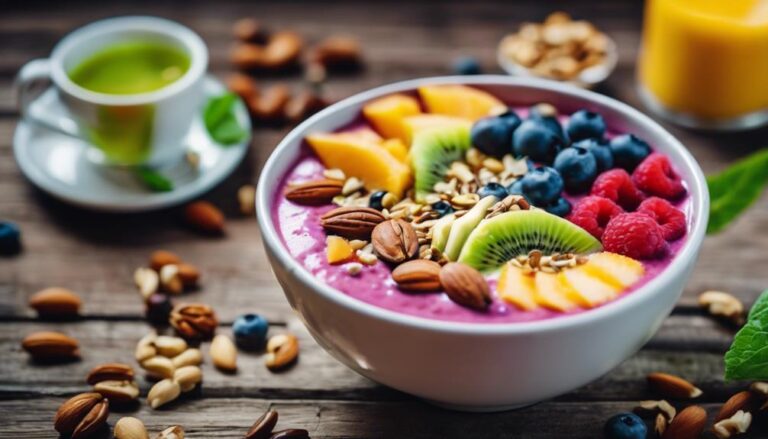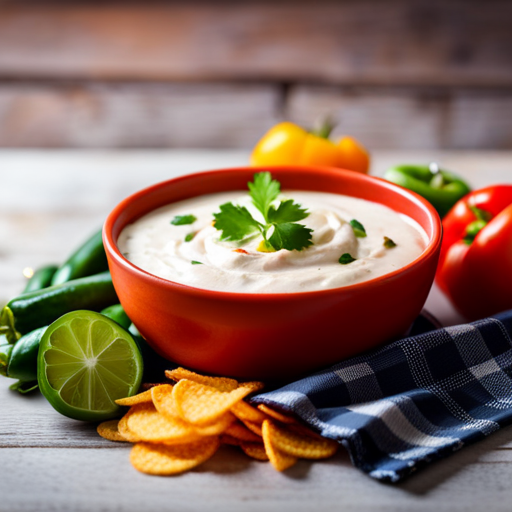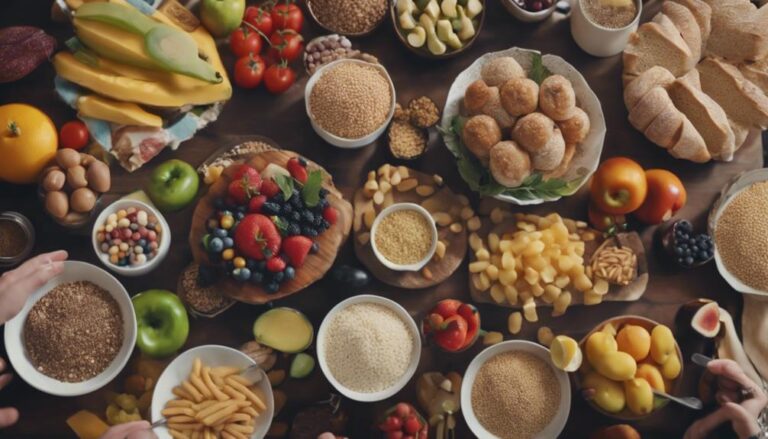Simple Steps to Cut Down on Processed Foods
If your diet were a garden, processed foods would be the weeds that hinder its growth. By making simple changes, you can cultivate a healthier eating routine. Start by examining your pantry and fridge for processed culprits.
What if I told you that with a few tweaks, you could revitalize your meals and nourish your body more effectively? Stay tuned to discover the straightforward steps to reduce processed foods in your diet and reap the benefits of a more wholesome lifestyle.
Key Takeaways
- Opt for whole foods over processed options for improved nutrition.
- Read labels to avoid hidden additives and artificial ingredients.
- Choose nutrient-dense options like fruits and vegetables.
- Reduce added sugars by selecting minimally processed foods.
Evaluate Current Food Choices
To begin improving your diet, assess the types of foods you currently consume on a regular basis. Start by keeping a food journal to track what you eat and drink throughout the day. This can help you identify patterns, areas for improvement, and where you may be consuming too many processed foods. Consider scheduling a nutritionist consultation to get personalized guidance on how to transition to a healthier diet.
Mindful eating is key to evaluating your current food choices. Pay attention to your hunger cues, and try to eat without distractions to fully enjoy and savor your meals. Aim for a balanced diet rich in fruits, vegetables, whole grains, lean proteins, and healthy fats. This can help ensure you're getting essential nutrients while reducing your intake of processed foods.
Read Ingredient Labels
When examining food labels, focus on identifying key ingredients to make informed choices about the products you consume. Reading ingredient labels is crucial in avoiding hidden additives and misleading labels that can be present in processed foods.
Here are three essential tips to consider when reading food labels:
- Look out for hidden additives: Be wary of ingredients like high-fructose corn syrup, artificial sweeteners, and hydrogenated oils, as these can be harmful to your health and often disguised under different names on food labels.
- Avoid common preservatives: Scan for preservatives such as BHA, BHT, and TBHQ, which are commonly used to extend the shelf life of processed foods but have been associated with negative health effects when consumed regularly.
- Beware of artificial flavors: Opt for products that contain natural flavors over artificial ones, as artificial flavors can contain a mix of chemicals that may not be disclosed on the label.
Cook Meals at Home
Consider preparing your meals at home as a healthier alternative to consuming processed foods. Cooking at home allows you to have full control over the ingredients you use, ensuring you avoid added sugars, unhealthy fats, and excessive salt commonly found in processed meals. It also gives you the opportunity to experiment with different flavors and textures, making your meals more enjoyable. To help you get started, here are some budget-friendly recipes and time-saving techniques to make cooking at home easier:
| Budget-Friendly Recipes | Time-Saving Techniques | Additional Tips |
|---|---|---|
| Vegetable Stir-Fry | Meal Prep on Weekends | Invest in basic kitchen tools like a good knife and cutting board. |
| Bean Tacos | One-Pot Meals | Double recipes and freeze leftovers for busy days. |
| Lentil Soup | Instant Pot Cooking | Plan your meals ahead and create a shopping list to avoid last-minute processed food purchases. |
Choose Whole Foods
For a more nutritious diet, opt for whole foods over processed options to enhance your health and well-being. Whole foods are packed with essential nutrients and are minimally processed, making them a great choice for those looking to improve their diet.
Here are three practical tips to help you choose whole foods and enjoy their benefits:
- Shop at Farmers Markets: Visit your local farmers market to find fresh produce that's often more nutrient-dense than what you might find in supermarkets. Supporting local farmers also helps the community and ensures you're getting the freshest options available.
- Focus on Nutrient-Dense Options: Choose whole foods that are rich in nutrients like vitamins, minerals, and antioxidants. Opt for colorful fruits and vegetables, whole grains, lean proteins, and healthy fats to ensure you're getting a wide variety of nutrients in your diet.
- Read Labels Carefully: When buying packaged foods, check the ingredient list and opt for products with minimal ingredients and no added sugars or artificial additives. Choosing whole foods with simple ingredients is key to avoiding processed options that may be high in unhealthy additives.
Limit Sugary Drinks
To reduce your intake of added sugars and improve your overall health, limiting sugary drinks is a smart choice. Sugary drinks are a significant source of added sugars in the diet, which can lead to various health issues like obesity, diabetes, and heart disease. By cutting back on sugary beverages, you can effectively lower your sugar intake and reduce the risk of these conditions.
When making beverage choices, opt for water, herbal teas, or sparkling water with a splash of citrus instead of reaching for sodas, energy drinks, or sweetened coffees. These alternatives aren't only hydrating but also free of added sugars, making them a healthier option for quenching your thirst.
Research suggests that reducing sugary drink consumption can have a positive impact on your overall health and well-being. By being mindful of your beverage choices and selecting options that are low in added sugars, you can take a simple yet powerful step towards improving your diet and cutting down on processed foods.
Opt for Fresh Produce
When looking to make healthier choices and reduce your intake of processed foods, one effective strategy is to prioritize fresh produce in your diet. Opting for fresh fruits and vegetables can significantly enhance your overall well-being.
Here are three tips to help you incorporate more fresh produce into your meals:
- Visit Farmers Markets: Explore local farmers markets to discover a variety of fresh, in-season produce options. Farmers markets often offer organic fruits and vegetables that are free from harmful pesticides and additives.
- Choose Seasonal Fruits: Opt for fruits that are in season as they tend to be more flavorful, affordable, and packed with nutrients. Buying seasonal produce also supports local farmers and ensures you're getting the freshest options available.
- Support Local Vendors: Consider purchasing fresh produce from local vendors in your area. By doing so, you can reduce the carbon footprint associated with transporting food long distances while enjoying produce that's picked at its peak ripeness.
Be Mindful of Portion Sizes
Mindfully controlling your portion sizes is crucial for maintaining a balanced and healthy diet. Practicing mindful eating allows you to be more aware of not just what you're eating but how much you're consuming. Portion control is a key aspect of weight management and overall well-being. Research suggests that people tend to eat more when larger portions are served, leading to excess calorie intake. By being mindful of portion sizes, you can prevent overeating and better regulate your food intake.
To practice portion control effectively, start by using smaller plates and bowls. This simple trick can help you reduce portion sizes without feeling deprived. Additionally, try measuring out servings according to recommended portion sizes to avoid unintentionally consuming more than you need. Pay attention to hunger cues and stop eating when you feel satisfied, even if there's food left on your plate.
Meal Prep for the Week
Consider planning and preparing your meals for the entire week ahead to help you stay on track with your healthy eating goals. Meal prepping can save you time, reduce stress, and make it easier to stick to nutritious choices throughout the week.
Here are three tips to help you make the most out of your meal prep:
- Batch Cooking: Dedicate a day to cooking large quantities of staple foods like grains, proteins, and vegetables. Store them in portioned containers to grab and go during the week. This will save you time and ensure you have healthy options readily available.
- Meal Planning: Take some time to plan your meals for the week, considering a balance of nutrients and flavors. Having a plan in place will prevent last-minute unhealthy choices and reduce the temptation to order takeout.
- Variety is Key: Prepare different meals for the week to avoid taste fatigue. Try incorporating various ingredients, spices, and cooking methods to keep your meals exciting and satisfying.
Avoid Fast Food
To maintain a healthy diet, it's essential to steer clear of fast food options. Fast food is often high in unhealthy fats, sodium, and calories, which can contribute to weight gain and various health issues.
When trying to avoid fast food, meal planning becomes crucial. By planning your meals ahead of time, you can ensure you have healthier alternatives readily available, making it less tempting to opt for fast food when you're in a rush or feeling hungry.
Instead of hitting the drive-thru, consider fast food alternatives such as preparing quick and nutritious meals at home or choosing healthier options at restaurants. Opt for grilled or baked dishes instead of fried ones, and include plenty of vegetables and lean proteins in your meals.
Swap Processed Snacks
When looking to improve your snack choices and cut down on processed foods, consider swapping out pre-packaged snacks for healthier alternatives. Making simple changes in your snack selection can have a big impact on your overall health.
Here are some healthy swaps and snack alternatives to help you make better choices:
- Fresh Fruits and Vegetables: Instead of reaching for a bag of chips or cookies, opt for fresh fruits like apples, berries, or sliced veggies like carrots and bell peppers. These options are packed with vitamins, minerals, and fiber, keeping you satisfied and energized.
- Nuts and Seeds: Snack on a handful of almonds, walnuts, or pumpkin seeds for a crunchy and satisfying treat. These options are rich in healthy fats, protein, and antioxidants, making them a great alternative to processed snacks.
- Greek Yogurt with Berries: Swap out sugary yogurts for plain Greek yogurt topped with fresh berries. This snack is high in protein, calcium, and probiotics, promoting gut health and keeping you full longer.
Reduce Added Sugars
To decrease your intake of added sugars, focus on reading food labels and choosing products with lower amounts of sugar. Sugar intake is a crucial factor to monitor as excessive consumption can lead to various health issues like obesity, diabetes, and heart disease. Many processed foods contain hidden sugars, so being mindful of ingredients is key. When checking labels, look out for alternative names for sugar such as high fructose corn syrup, maltose, or dextrose. Opt for products that have less sugar per serving or choose whole foods like fruits and vegetables that offer natural sweetness without the added sugars.
Reducing added sugars in your diet can be a significant step towards improving your overall health and well-being. By being aware of hidden sugars in processed foods and making informed choices, you can take control of your sugar intake and make positive changes to your diet. Remember, small changes can lead to big results when it comes to managing your sugar consumption.
Find Healthier Alternatives
To make healthier choices and reduce your consumption of processed foods, seek out alternatives that are whole, nutrient-dense, and minimally processed. When looking for healthier options, consider the following tips:
- Healthy Swaps: Replace processed snacks like chips and cookies with fresh fruits, vegetables, nuts, and seeds. These alternatives are rich in vitamins, minerals, and fiber, providing your body with essential nutrients while keeping you full and satisfied.
- Better Options: Opt for whole grains such as quinoa, brown rice, and oats instead of refined grains like white bread and pasta. Whole grains retain their fiber and nutrients, supporting digestive health and providing sustained energy throughout the day.
- Explore Plant-Based Proteins: Incorporate plant-based protein sources like beans, lentils, tofu, and tempeh into your meals to reduce reliance on processed meats. Plant-based proteins offer a healthier alternative with less saturated fat and more fiber, promoting heart health and overall well-being.
Frequently Asked Questions
Are There Any Specific Cooking Techniques That Can Help Preserve the Nutritional Value of Whole Foods?
To preserve the nutritional value of whole foods, consider cooking methods like steaming, roasting, or sautéing instead of deep-frying. These techniques help retain nutrients while enhancing the natural flavors of the ingredients, making your meals delicious and wholesome.
How Can I Incorporate More Variety Into My Meals While Still Cutting Down on Processed Foods?
To add variety while cutting processed foods, try flavorful substitutions like using herbs and spices, swapping refined grains for whole grains, and incorporating more fruits and vegetables. Get recipe inspiration and plan meals ahead for success.
Can You Provide Tips on How to Make Meal Prepping More Efficient and Sustainable for Busy Individuals?
You're juggling a million things, but with some savvy time management, meal planning can be a breeze. Look for cost-effective ingredient options and streamline your prep process. Your future self will thank you!
What Are Some Creative Ways to Use Fresh Produce in Meals to Make Them More Appealing?
To make meals more appealing, try creative ways with fresh produce! Jazz up salads with vibrant veggies and tasty dressings. Blend up smoothie bowls with colorful fruits and nutritious toppings. Enjoy a rainbow of flavors!
How Can I Navigate Social Situations or Dining Out While Trying to Avoid Processed Foods?
When navigating social situations or dining out, opt for simple swaps like choosing grilled instead of fried, asking for dressings on the side, and planning ahead by checking menus for healthier options.
Conclusion
In conclusion, by evaluating your current food choices, reading ingredient labels, cooking meals at home, and choosing whole foods, you can easily cut down on processed foods.
Limiting sugary drinks, avoiding fast food, swapping processed snacks, reducing added sugars, and finding healthier alternatives are also effective strategies to improve your diet.
Remember, making small changes can lead to big health benefits in the long run. So why not take a step towards a healthier lifestyle today? Your body will thank you for it.





